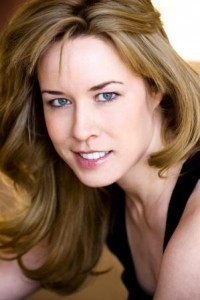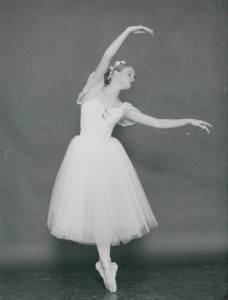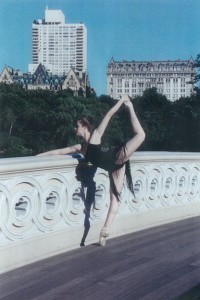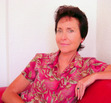Life After Les Sylphides
An Interview with Georgia Reed
Whether leaping across a stage or playing a tough-girl role, Georgia Reed embodies grace, heart and a love of art and audience. In the short time I have been privileged to share Georgia’s journey, I have watched her go from strength to strength in a string of starring roles that has drawn upon her multiple talents as a dancer, actress and singer. In true Superwoman fashion, she also produces and writes for the screen. The following interview follows a rising star from the classical stage to the popular, from New York to Hollywood. Welcome, Georgia!
You trained from an early age as a ballerina and spent many years dancing with ballet companies. What was the most rewarding aspect of being a ballerina? What challenges did you face?
The most rewarding aspect of being a ballerina, for me, was the opportunity to dance on various stages to some of the most beautiful music I’ve ever heard, and to share my interpretation of the music and the movement with a live audience. There were moments it was just me and the audience breathing in and out together—you can feel that as a dancer, when the audience is really connected to what’s happening on stage. Sometimes it feels like I have become the music and my body is simply the paint with which the music is creating a picture for the audience. It’s thrilling. The challenges as a ballerina are endless! Every day, striving to increase perfection of skill, extension, turns, grace, timing, presence… It is a never-ending journey of self-improvement. And, when I felt tired, injured, alone and/or frustrated, as a professional I was expected to show up and do the work regardless of personal problems—as in any job, I expect, but, of course, a ballerina must do it in a tutu and pointe shoes.
 What made you decide to transition to acting? In what ways did ballet prepare you to be an actress?
What made you decide to transition to acting? In what ways did ballet prepare you to be an actress?
I have loved acting, and singing for that matter, all my life, at the same time I loved dancing. However, it was impressed upon me at a young age that if I wanted to succeed in ballet, I would need to make a choice between the three loves, and focus on one. Since it seemed like acting and singing were things I could do when I was 90, I chose ballet as my focus. This was when I was about 12 years old. A year or two later, I had one of the soloist roles in the pre-professional dance company’s production of Les Sylphides (to this day my favorite ballet) and the role was a validation of my decision. When I sustained a serious foot injury at 19, while under contract with a company, I kept dancing anyway (as all professionals do), and ended up in New York City, where I think I finally burned out. Also, throughout my career in dance, I was always more interested in the motivations behind the movement—if I was performing a character, such as Giselle, I wanted to know why she fell for Albrecht, why she died, and even wrote diaries in character. This was the beginning of acting for me. So, living in New York City, burned out on ballet, and feeling like I was in a space where I could make some new choices, I decided to start training in acting and singing once again. Eventually I was able to return to dancing as well, for which I am very grateful. Ballet is not just about being skinny and having a high extension; there is passion, and feeling, and emotion to be expressed in the movement. These qualities are equally important in acting, and in any artistic endeavor, I think.
What was it like to move from the classical stage to the popular? From New York to Hollywood?
It’s fascinating—both genres, both cities, are wonderful in their own way—and they each have their own set of rules. Of course, the only real rule is that there are no rules in creating art, in making a career path. Commercial work versus theatrical work? In the end, it all has to come from an authentic place. If the TV show/play/film/song/car advertisement feels phony to the viewer, then it doesn’t work. At least, that’s what I’ve noticed. I love to switch between stage and screen. It’s like a tight rope, and there are always new challenges. I guess being raised in the world of ballet has conditioned me to crave constant challenge and change.
You and I first met through our shared interest in film. What draws you to the screen, and what do you aspire to achieve in film and/or television?
film and/or television?
Film and television affords us the opportunity to get really up close and personal with the story. As an actor, the camera catches every nuance of your character work. It’s like using a scalpel instead of an axe: the fine details of the character are brought out through the eye of the camera. This kind of deceptively simplistic work draws me to the screen. I aspire to do great work like my film idols—Meryl Streep, Glenn Close, Cate Blanchett, Ellen Burstyn, Ian McKellan, Gary Oldman, Kevin Kline… to name a few. But my hope is to find my own voice and do work that will inspire and entertain audiences just as the amazing actors I just mentioned have inspired and entertained me. I really hope to work right up until the day I die!
You are currently working on a book. Would you like to share a “sneak preview” with our readers?
My personal experience as a dancer may be a story that is not uncommon in the world of ballet, but something keeps telling me to share it in writing. Ballet had such a big influence on my life, almost like a second religion, or a second set of parents, and the more space I get between myself and those years of day-in-day-out dancing, the more perspective I have on the whole situation. The funny thing is, out of all the dancers I with whom I trained, there were so many other girls who were more talented, skinnier, received the scholarships, etc., and yet very few went pro. I feel lucky to be able to continue to dance today and hope that my story will be a sort of inspiration, or perhaps catharsis, to others when they read it.
You were among the first performing artists to read my novel You, Fascinating You, which tells the story of a ballerina from another era. To what extent were you able to relate to the book’s protagonist Margit Wolf? What has stayed with you about her story?
Oh, the book was something that affected me on many levels. Margit had aspirations like many young dancers, and she made it so far toward her dreams. Of course, it was never enough. I don’t know if there are dancers out there who feel like it will ever be enough, that they’ve “arrived.” But Margit made the choice of love over career—this is something I struggled with even as a teenager, when my friends were going to prom and I was going to rehearsal. When Margit was betrayed by this choice, left alone to raise a son and die after barely surviving the war, it was heartbreaking. I think anyone who has ever had a dream and wondered whether they made the right decisions in life will connect with this book. And they say love conquers all—but in this case, does it? Was Margit’s love for ballet the choice she should have made over her love for Pasquale?
What’s next for Georgia Reed? Is there anything else you would like to share with our readers?
My goal is to continue to act, sing, and dance both on stage and on screen, and to create art that inspires and entertains. My website http://www.georgiareed.com is a great place to find out about what I’m currently working on, and I encourage anyone interested in learning more to contact me.
Thank you, Georgia. Watch this blog for upcoming interviews with soloist dancer Elana Altman of the San Francisco Ballet and Kinga Nijinsky Gaspers, granddaughter of the legendary Vaslav and an artist in her own right.

Germaine Shames' Blog
- Germaine Shames's profile
- 10 followers



